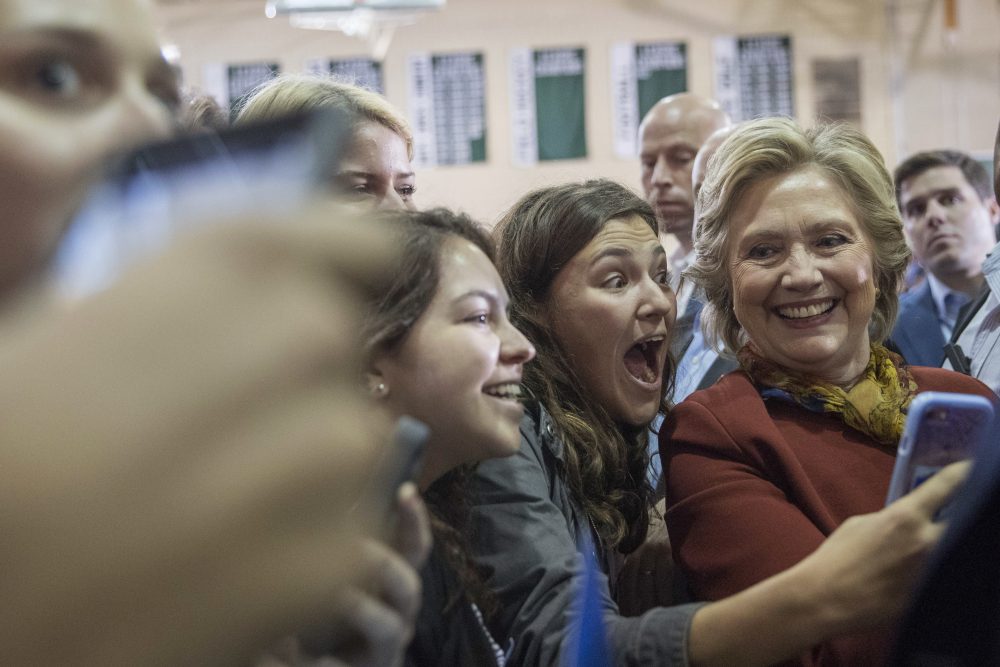Advertisement
Poll Shows Clinton Has Gained Significant Ground With Millennial Voters
Resume
With less than two weeks to go until Election Day, a nationwide poll released Tuesday by Harvard University's Institute of Politics suggests Hillary Clinton has gained a lot of ground with the nation's youngest voters.
The poll of more than 2,000 18- to 29-year-olds, conducted Oct. 7-17, finds Clinton with a commanding 28-point lead — 49-21 — against Donald Trump in a four-way race that includes Libertarian Gary Johnson and Jill Stein of the Green Party.
"Hillary Clinton has had a pretty complicated relationship with millennials, thinking about the last eight years," said John Della Volpe, director of polling at Harvard's Institute of Politics. He says that challenge with millennials goes back to 2008, when Clinton ran against Barack Obama, who was very popular with younger voters. Then this year she ran against Bernie Sanders, who was even more popular with them.
But Della Volpe says the institute's latest poll finds that Clinton is doing even better than President Obama was four years ago among key groups within this younger demographic.
"She's changing the shape of the electorate: We'll have more females in the electorate than we did in 2012."
John Della Volpe, director of polling at Harvard's Institute of Politics
"For example, she is doing significantly better among young women," he said. "She's changing the shape of the electorate: We'll have more females in the electorate than we did in 2012."
Among young women, Clinton polls 14 points better than President Obama did four years ago. Fifty-one percent of female millennials say they will definitely vote next month — compared to 45 percent four years ago. Among younger male voters, 47 percent say they'll be voting in November — down from 51 percent in 2012. So the poll suggests young women are more motivated to vote than young men. It also finds that among these younger voters, Trump is 17 points behind where Mitt Romney was four years ago.
Kat Muraviyova, a Boston University student from Houston, represents that new, young female voter who will cast a ballot for Clinton — and against Trump.
"First of all, Clinton does have experience. I think a Trump presidency would be a very terrifying presidency," Muraviyova said. "For example, he's trying to overturn Roe v. Wade. He claims that he has the most respect for women out of anyone. First of all, he was bragging about sexually assaulting women, then he denied the whole thing because she's not attractive or what not."
Another BU student, Samuel Crisafulli, of Rhode Island, represents that younger male voter who's less committed to this election. Crisafulli says he's disenchanted with both major party candidates — beginning with Clinton.
"Just how corrupt she's been said to be — all the issues with emails and Benghazi," Crisafulli said. "And then with Trump you have everything he's said and his billionaire attitude. He thinks he can do whatever he wants, thinks money is going to win him the election. I just don't agree with either of those."
So Crisafulli says he's considering voting for a third party candidate. According to the Harvard poll, just 5 percent of millennials support the Green Party's Stein, and 14 percent support Libertarian Johnson. But Della Volpe says Johnson's support is soft.
"Thirty-seven percent of that 14 percent indicates they are likely to vote for someone else," Della Volpe said. "So he has a relatively small proportion of the vote, and it's pretty unstable."
Della Volpe says another key finding from the survey is this: Only one in five millennials reported that they feel "hopeful" about the future of America, while more than half — 51 percent — are "fearful."
"And it's something that we've been tracking for a quite a while now, and I think a lot of it is focused around the American dream, or the sense that it's not as attainable as perhaps we would like or were told, if you worked hard and played by the rules," Della Volpe said.
Crisafulli, the BU student from Rhode Island, understands the pessimism among his fellow millennials. He says the negativity of the election isn't helping.
"I mean at this point in our time, you know, in our lives, we don't know what we're going to do with our future. We're still getting educated," Crisafulli said. "And to see an election like this while we're growing up and thinking about our future, it's really tough to see the light with this election. And I think that really plays into this lack of optimism."
According to the Harvard survey, a minority — just 40 percent of millennials — believe they'll be better off than their parents.
When asked why they were fearful about the future, one respondent said, "Everything seems out of control ... We're extremely divided, and few politicians seem to have any interest in trying to unite us."
This segment aired on October 27, 2016.
